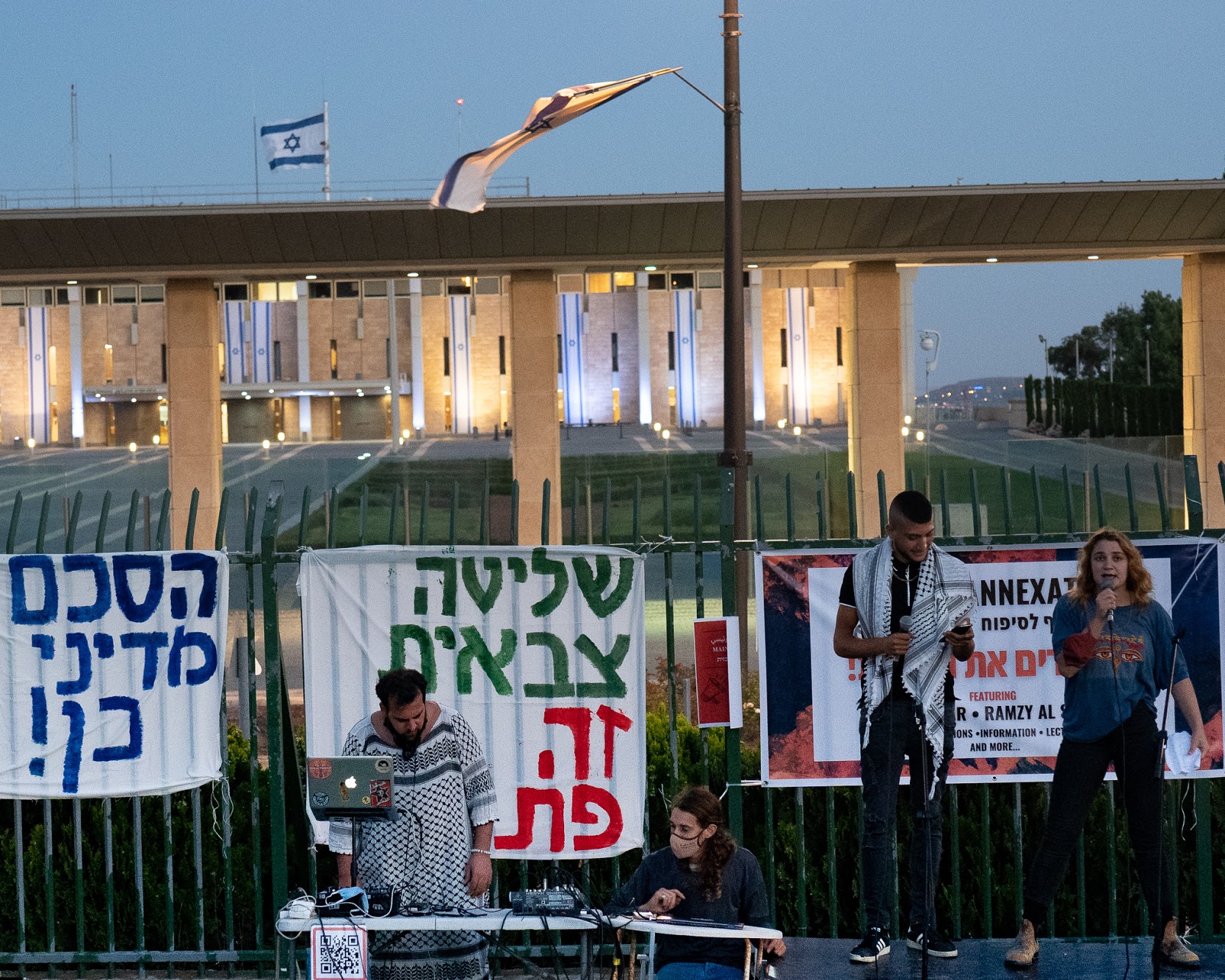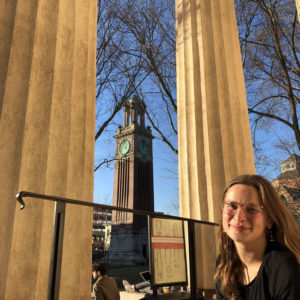“This is the voice of peace, no more war, no more bloodshed.”
My two friends, Gali and Adam, an Israeli and a Palestinian, shouted this chorus on a makeshift stage in a park in front of the Knesset, the Israeli Parliament, in Jerusalem. Their rap flowed between English, Hebrew, and Arabic, talking about oppression, borders, and most importantly, the annexation. Their performance was one act in a larger event that I organized, along with twenty others, on June 30th— the eve of Israeli Prime Minister Benjamin Netanyahu’s proposed annexation (סיפוח, sipuach, in Hebrew) of one third of the West Bank. The event was the culmination of a 10-day protest camp outside of the Knesset, where we brought activists, politicians, and artists together.
I’m an American Jew; I don’t speak much Hebrew or any Arabic. But as I watched Gali and Adam singing in a crowd of over 150 people, I didn’t feel isolated by my lack of fluency. The essence of their words was clear in any language: no to annexation, no to occupation.
In May, when Netanyahu announced plans for the July 1st annexation, I was finishing a semester at the Arava Institute for Environmental Studies, an environmental peace-building program on a kibbutz in southern Israel. Americans, Israelis, Palestinians, and other internationals study together, with weekly dialogue sessions unpacking the political reality of the Israeli-Palestinian conflict. I spent the semester (which continued through the Covid-19 crisis) hearing stories from Palestinian friends about their siblings’ imprisonment, or how their grandfathers never forgot their lost farm across the Green Line.
As the semester came to a close, my classmates and I convened a meeting in our student lounge to address the annexation. With time and resources on our hands, we wanted to find creative ways to reject Netanyahu’s proposal. Netanyahu was calling for Israel to ‘apply sovereignty’ to around 30% of the West Bank, mainly in the Jordan Valley (although he did not release a proposed map). However, he did not state what would happen to the Palestinians living in towns in the fertile, agricultural land of the West Bank. They would either live in Palestinian enclaves, entirely surrounded by Israel, with military presence and checkpoints severely limiting their movement, or would become second-class ‘residents’ of Israel, like those currently living in East Jerusalem.
At the Institute, I heard stories from my Palestinian friends about humiliations at checkpoints—strip searches, guns pointed directly in their faces. I wanted to fight against an increasingly militarized future for them and their families. And since the annexation is not popular—polling by the Geneva Initiative shows more Israelis oppose than support it—my group and I focused on how to unite people opposed to Netanyahu’s illegal land grab.
At the meeting, someone proposed building a protest camp in front of the Knesset. I was on board immediately. Without clear summer plans or family to stay with in Israel, I figured I could completely delve into the extended protest. Only once I got there did I realize what I had gotten myself into.
Most people present at the camp each day were Israelis and a couple of Americans like me from the Arava Institute. Many of our Palestinian friends—even those who are Israeli citizens—didn’t feel comfortable publicly sharing dissident opinions out of fear of government surveillance and possible retaliation in future jobs or academic possibilities. Most activities and events were directed towards the Israeli public, and were therefore conducted in Hebrew. The first few days, I questioned my presence at the camp; I couldn’t navigate interactions with the police, or reach out to Israeli press. I relied on Israeli friends to translate every interaction. I didn’t know why I was there, beyond just trying to seem like a good leftist. I lacked concrete ways I could help the protest more than just being another body at the camp.
I met with the other Americans at the camp, sitting around a colorful straw picnic blanket (מחצלת, maħ’tzelet, in Hebrew) to discuss our role there. It was only after we talked about the simultaneous anti-annexation protests from American Jewish groups like IfNotNow that I found my place in the conversation. When we call the political situation here the “Israeli-Palestinian conflict,” or say that annexation is an “Israeli-Palestinian affair,” we’re missing the mark. It’s an Israeli-American problem. Netanyahu is only willing and able to carry out annexation, and extend the oppression of the occupation because he has Trump’s unwavering support. While Netanyahu has now delayed the annexation, it is still only politically possible for him because of American backing.
And that support goes far beyond Trump—there’s a tacit assumption of uncritical support for Israel within the American Jewish community. I did not grow up in a Zionist household or with pro-Israel education. Yet still, certain elements still seeped into my mindset, like the expectation that I would go on a birthright trip after hearing stories of 10-day adventures from friends and family. So if the Israeli government justifies their oppressive actions in the name of the future of Jewish peoplehood worldwide, it feels like my obligation to publicly insist that Israel does not speak for me. My Jewish identity is entirely not contingent on whether or not there are Israeli settlers in Hebron or if Israel remains a majority-Jewish state.
At the protest camp, I also began thinking about how to apply principles I’ve learned from anti-racist contexts in the U.S. to Israel: white people educating other white people, and putting their physical bodies on the line for Black Americans. As an American in Israel, I can talk to English-speaking immigrants to Israel, and use a shared vocabulary to explain why I believe the annexation would lead to the creation of an apartheid state. I can pressure the U.S. government to shift to conditional aid to Israel. And unlike my Israeli friends, I can stand up for Palestinian rights without fear of societal backlash.
During the protest on the 30th, an Israeli from my program read letters from my friends from the West Bank and Gaza who could not be with us. My friend Muhammad wrote a note reminding Israelis of their privileges: traveling easily, not worrying about their house being demolished, being able to find well-paying jobs.
As a white American Jew in Israel, I benefit from the same list of privileges. I fly through checkpoints in the West Bank without raising suspicion and can always find a host for Shabbat dinner. If the Israeli government will not allow my Palestinian friends to protest alongside me in Jerusalem, then I will be on the streets for them, sharing their words and stories as long as I am in Israel. Back in the U.S., I will continue this work, as American institutions work to actively silence pro-Palestinian efforts. Because as an American Jew, I do have a stake in the future of this conflict, and if I’m not part of the voice of peace, who am I?
Featured image credit to Omri Eran Vardi

